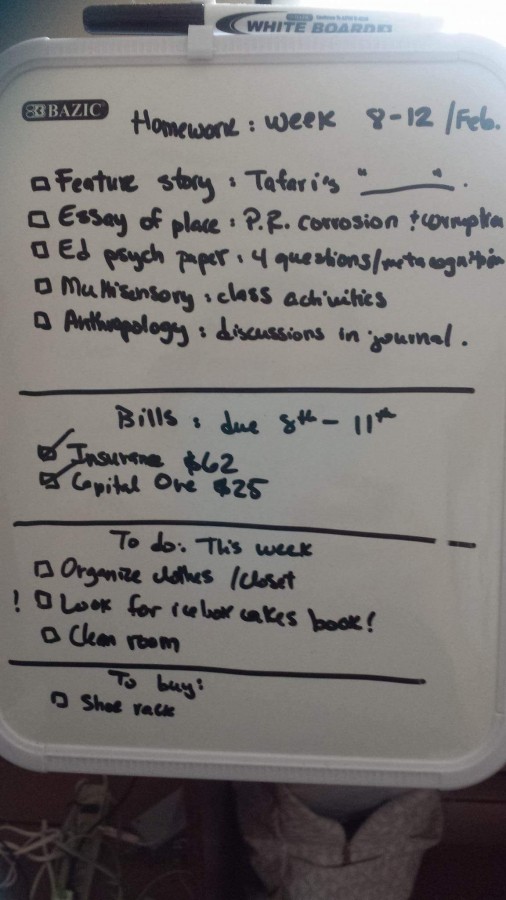When it’s more than just homework…
March 17, 2016
For nearly every student, college will at one point or another be difficult. While some situations are a result of poor decisions and can be remedied by not repeating those choices, others are less in a student’s control and can create some exceptional struggles.
Bouncing back from a hangover is pretty fast. Bouncing back from nearly a weeks’ worth of all-nighters, not so much.
So what happens when nearly every single day is an exceptional struggle?
Chanelle Brodeur commutes twice a week from Vermont. She starts school at 9:25 am and besides the c-hour break when she eats, is in classes until 3:10 pm. Then begins the one hour trek back home. She works 7:00 a.m. to 3:30 p.m. on the days she doesn’t come to school. After a day of school or work comes the momentous task of finding the energy to get done her homework for her five classes.
“I have no time for de-stressing. My mind is rampant with all the things I have to do,” explained Brodeur, a senior Sociology major.
Working 24-32 hours a week, Brodeur finds it difficult to find time to take care of things that aren’t school or work.
In terms of watching her health, she remarked: “I have no energy to work out. I try to eat good…and want to make better decisions about what I eat. I get so stressed though and all I ever want is pizza.”
Her situation is reminiscent of that of senior Communications major Heather Brouillard.
“I sit in my car…and eat the lunch I packed from home, and as soon as I’m done I drive to work,” said Brouillard. The lunches aren’t particularly healthy. Neither is the amount of time she has to eat: 10 minutes.
Like Brodeur, Brouillard takes no night classes, but in this case it is so she can work one or both of her two jobs at night, which she does 6 days a week. A typical day for her starts with classes at 8:00 a.m. until 1:45 p.m., then lunch and the commute to work, with work ending at 10:30 at night.
That’s a 14 hour day.
“The days I only have one job I try to squeeze in homework. The days I have two jobs there’s absolutely no chance,” Brouillard said. “I try to when I get home at night, but I’m usually just too tired. I’m only really home to sleep.”
 This constant sense of exhaustion was echoed among all the students I spoke to.
This constant sense of exhaustion was echoed among all the students I spoke to.
Francesca Cordero is a junior Accounting major who commutes 25 minutes to school and works a whopping 50-55 hours a week. She takes only 4 classes because she has learned through past semesters of experience she cannot handle any more than that.
“I try to do homework if I have time in between classes, but most of the time I forget about it since I have a lot on my mind,” Cordero explained.
Cordero works three closing shifts per week at work, which means she gets out of work at 2:30 a.m. Her boyfriend is also in school and works full time. Though they live together, she says they interact with each other for less than three hours a day.
In response to their social lives, all the students I spoke to laughed.
“If I wanted to sacrifice my sleep, I guess I could fit in social activities on the two days I don’t work,” said Cordero.
Brodeur added, “I’m too tired to hang out with friends.” She also said being tired constantly makes her cranky and she only really gets four hours of sleep a night.

Money is always a major factor when it comes to stressed out students.
Kathyria Beltran, a senior English major who lives in Springfield, dreads Tuesdays because she takes six classes total, and five of them fall on Tuesdays. With one break during C-hour, she is in class from 9:25am to 9:00pm. The first time she did a full Tuesday, she recalls saying “I can’t do this, I can’t do this.”
Like Brouillard, she reports her stress level is about an eight on a scale of 1-10, and says she sleeps five hours a night.
“It’s really hard to juggle everything in my life when I only have two hands and have eight issues at a time,” she said sadly.
Not even mentioned yet are the student’s financial situations: all four struggle to some extent financially: Cordero had to choose once between getting rash cream for her dog and buying textbooks and paying her rent. It’s easy to say which had to wait.
These students use their income to pay for school, so to suggest not working to ease the stress would be impractical. They need to work to pay for school, and they need to go to school to work get degrees so they can work better jobs in the future.
The cycle feels endless.
Beltran names financial instability as her primary source of stress, being that she is partially responsible for supporting her family.
To save money on food, Cordero eats mostly Wendy’s. As a manager there, she gets free food. She wishes she could eat much healthier but simply cannot fit it into her budget.
So what picture does all of this all paint?
That of overstressed, overworked, exhausted, broke students who are supposedly living the best years of their lives. Rather than being the best years of their lives, they all agree they cannot wait for it to end.
Brodeur summed it up as such: “Life isn’t fun right now. I can’t wait to graduate.”



